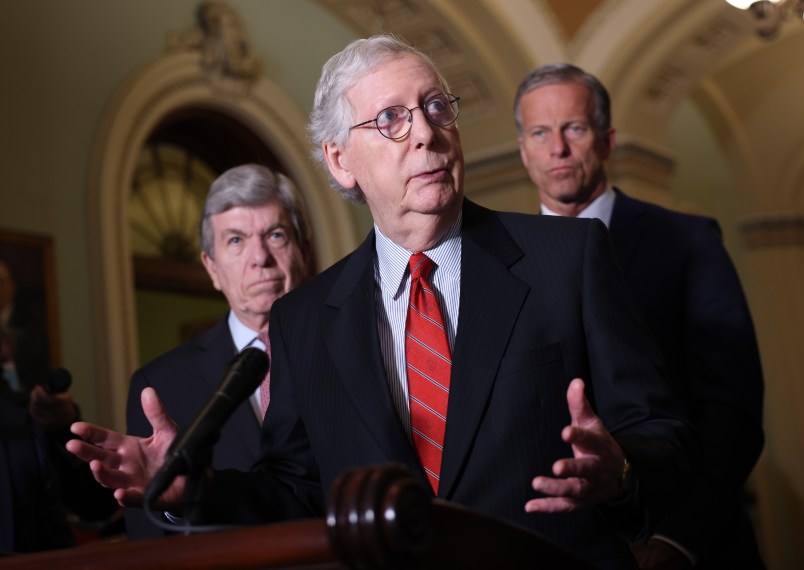Senate Minority Leader Mitch McConnell (R-KY) made short work of any notion that Sen. Joe Manchin’s (D-WV) voting compromise would attract Republican support, calling it “equally unacceptable” to the original For the People Act and “totally inappropriate.”
Flanked by eight GOP senators, McConnell held a special additional press conference on S.1, Thursday, seemingly feeling the need to hammer his criticisms in the wake of Manchin nudging a door open to intra-Democratic compromise on the bill.
In both his remarks and a statement released around the same time, McConnell emphasized that the compromise had been endorsed by Stacey Abrams. He painted the proposal as a federal takeover of state-run elections — a “solution in search of a problem.”
“All Republicans, I think, will oppose that as well if that were to be surfaced on the floor,” he said of Manchin’s proposed alterations to S.1. “That’s not what we anticipate the cloture motion to be on.”
Thus, Manchin’s proposals represent more of a compromise amid the Democratic Party than any involving Republicans, who have positioned themselves against federal voting safeguards.
Before the release of his memo, Manchin had declared himself against voting legislation that lacked Republican buy-in. The new document at least indicated his policy positions, though some experts see them as a mixed bag.
“Overall, it’s encouraging that he’s supporting this kind of stuff and discouraging that he left a lot of stuff out,” Bill Yeomans, a longtime voting rights expert at the Department of Justice and lecturer at Columbia law school, said. “There’s so much stuff here that it’s hard to make sense of without more detail — but Joe’s in the game, that’s good.”
Even if his reforms were to be added into S.1 immediately, before next week’s vote, the bill almost certainly wouldn’t pass. With the filibuster in place and no Republican support, Democrats alone can’t vote it into law. Anti-filibuster advocates hope that the pressure to pass the bill, which Democrats have marketed as crucial to beat back the existential threat to democracy, will convince Manchin and fellow filibuster supporter Sen. Kyrsten Sinema (D-AZ) to change or eliminate the Senate rule.
Neither has indicated that they plan to do so, though Manchin’s memo at least heightens the chances that, if his concerns are addressed, there will be 50 votes for the bill and a stronger case against the filibuster.



